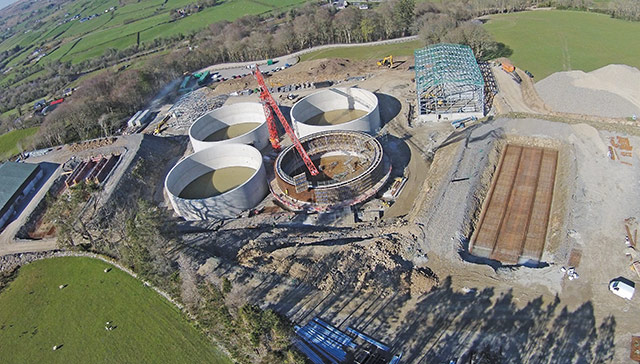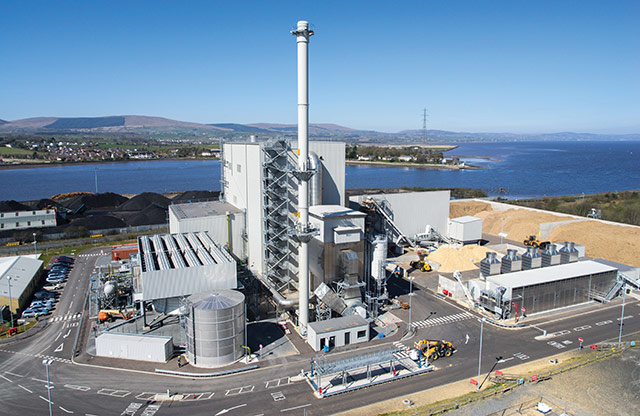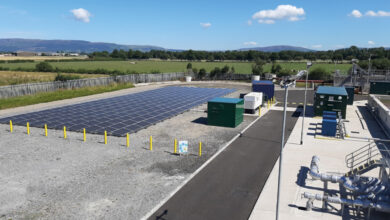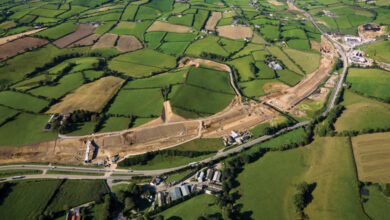Spotlight on energy infrastructure

Good energy policy is about establishing a robust and clear regulatory environment, while finding the right balance between often competing objectives of energy security, consumer costs and environmental considerations.
While Northern Ireland energy policy had found a reasonable balance of objectives over the past five years, recent political rhetoric from both Westminster and the Northern Ireland Executive, along with policy inertia in key areas, suggests a worrying direction of travel that could harm the long-term energy environment of Northern Ireland.
Recent energy environment
In 2010 the Northern Ireland Executive set out a refreshingly clear and bold Strategic Energy Framework. Its vision was to de-carbonise the Northern Ireland energy market by moving to 40 per cent renewables by 2020; reduce the 90 per cent reliance on imported fuel by utilising indigenous energy sources; expand the gas network to more businesses and homes; generate 10 per cent of heat from non-fossil sources; and to invest in the grid network, including a second North-South interconnector, to create a seamless all-island energy market.
This Framework, supported by tariffs, subsidy regimes and regulatory certainty, has delivered a number of notable successes – at 25 per cent of electricity consumption, renewable energy generation has surpassed the 2015 interim target of 20 per cent (see case studies opposite on major renewable energy assets in which KPMG played a key role), while Gas to the West is currently being deployed.
Being only halfway through the Framework period, and on the back of these successes, one would expect the policy direction to remain consistent and focused to see the vision through. Instead however we have seen a number of recent policy U-turns.
The most tangible policy shift is in the regulatory support for renewable energy deployment. Over recent months virtually all support mechanisms have been systematically withdrawn – first with the scrapping of Levy Exemption Certificates (“LECs”) in 2015, the closure of the Renewable Heat Incentive (“RHI”) in 2016, followed by the closure of the Renewable Obligation Certificates (“ROCs”) in 2016/2017. By April 2017 no renewable support mechanisms will remain, leaving Northern Ireland the only jurisdiction across the UK and Ireland without any renewable energy support. While local politicians (somewhat rightly) blame Westminster and recent Conservative Government policies, very few have put up strong opposition, instead seeing it as an opportunity to sideline the previously stated energy framework in favour of the more populist issue of consumer cost.
While consumer cost is clearly important, this is one of only a number of competing objectives. Indeed a recent DETI-commissioned interim review (‘Review of Costs and Benefits of Northern Ireland Executive’s 40 per cent Renewable Electricity Target’) actually found that “there is little difference between the cost of 15 per cent and 40 per cent [renewable energy] deployment [in Northern Ireland]” concluding that “economic analysis indicates that increasing the level of renewable electricity to 40 per cent is the best option”. Furthermore, with a significant pipeline of projects still in the development pipeline, often with millions of pounds of sunk costs, along with many renewable technologies, including solar and wind, targeting zero subsidy deployments by 2020, cutting them adrift halfway there seems short-sighted and counter-productive.
Other areas where policy inertia has set in is underinvestment in the Northern Ireland electricity grid. At present no new generation assets are being granted grid connection offers, while the North-South interconnector, the single most critical piece of Northern Ireland energy infrastructure, remains stalled and won’t be delivered until 2022/2023 at the earliest. SONI, the system operator, has clearly articulated that “security of supply in Northern Ireland would be at risk if the second North-South Interconnector is delayed”.
Now is not the time to abandon Northern Ireland’s ambitious energy objectives. In the long-term Northern Ireland will be better placed by becoming a low-carbon, diversified energy producer, generating the majority of its power from its own natural, indigenous resources rather than relying on commodity imports of fossil fuels.
With our local politicians having received a fresh mandate to govern, and to soon release a new Programme for Government, we would urge Stormont to maintain its previously stated energy objectives, to push for Northern Ireland to have access to the same support mechanisms available elsewhere in the UK, and to recognise the long-term benefits that infrastructure investment can bring to the economy.


KPMG has been heavily involved in the development of and fundraising for some of the most significant and innovative renewable energy projects developed in Northern Ireland over recent years. A small selection of these projects includes:
Full Circle Generation EfW
Full Circle Generation is a state-of-the-art waste to energy gasification plant which is currently under construction in Belfast Port and which is due to become operational in Q4 2017.
Developed by leading Northern Ireland waste company, RiverRidge Recycling, the £107 million energy plant will generate 15MW of renewable electricity from local household and commercial waste streams, supplying the majority of the output directly into Bombardier’s C-Series factory, providing lower-cost, renewable power to help secure the long-term competitiveness of one of Northern Ireland’s largest employers.
Glenmore Anaerobic Digestion Plant
Once operational in late 2016, the £23 million Glenmore anaerobic digestion (AD) plant, which reached financial close in February 2016, will be the largest AD plant in Ireland.
As well as generating 4MW of renewable electricity from waste materials for use by leading Northern Ireland manufacturers, the plant will also provide a long-term outlet for significant quantities of Northern Ireland poultry litter, helping support the sustainability of this important Northern Ireland sector.
Par Renewables
Par Renewables, based in Coleraine, was one of the first 500kW farm-scale anaerobic digestion projects developed in Northern Ireland. It represents a great example of how Northern Ireland specific policy focus and support was the key enabler in the development of infrastructure which supported the diversification of the rural economy, created much needed base load power generation, as well as an outlet for waste products and alternative options for under-utilised farm lands.
Evermore Renewable Energy
Evermore Energy is an £81 million, 15MW wood-fuel power station in Derry. Completed in 2015, the project represents one of the largest base-load renewable energy projects ever built in Northern Ireland and provides enough renewable energy to power over 25,000 homes, saving over 3.7 million tonnes of CO2 emissions, while creating skilled jobs in the North West region.
Russell Smyth, Director
KPMG Deal Advisory
Tel: 028 9089 3814
Email: russell.smyth@kpmg.ie





